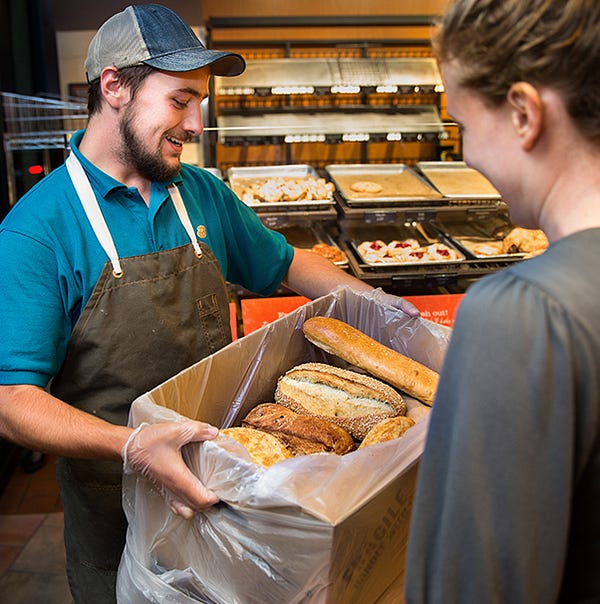Experts like Tony Robbins and Adam Grant prescribe generosity as the medication to achieve a happy and successful life.
It makes sense because, scientifically speaking, donating to charity feels like sex to your brain.
If we are happier when we give, why aren’t we more generous?
Like anything else, people find excuses. Whether it’s a lack of money to make an impact, detachment from responsibility, or just plain apathy, giving seems like it takes copious amounts of time and resources.
Katie Bennett from Ama La Vida coaching dispels this rationale:
Sometimes it is actually the smallest gestures that can make the biggest impact — the everyday little things that touch other’s lives. When we adopt this mentality, two great things happen.
- We realize we don’t need a certain amount of time or money in order to give and therefore we stop delaying it.
- We break down the mental barriers that are preventing us from giving and we start building generosity into our everyday lives.
Armed with simple, effective, and inexpensive (even free) practices, giving can be easy. Individual generosity can trigger a ripple effect that inspires positive change in our world. I encourage you to embrace the responsibility of initiating small steps and offer your own ideas to grow this list as you share it!
1. Donate For Free Every Time You Buy From Amazon.
Amazon has over 65 million Prime users. You’re probably one of them. When you order from Amazon, use “smile.amazon.com.” You choose the charity, and they donate a portion of your eligible orders at no cost to you. Everyone wins.
2. Support Your Friends’ Businesses.
Entrepreneurs use social media for their businesses. “Like,” “Share,” or comment on your friend’s business content (assuming it doesn’t conflict with your values). It’s easy, free, and strengthens your friendship, and their business. It creates a reciprocal loop for others to interact with your content too. It’s fascinating how far one like, share, or comment can go. (Cue @GaryVee — Mathematically, 1>0). If you’re feeling extra generous, buy a product or service from your friends’ business at (*gasp*) full price. There should be no such thing as the “friend discount.”
3. Box Up Leftovers For Someone In Need.
Americans throw away billions of pounds of food each year. Many times during a meal out I’ve not finished my entire plate. In the past, I’ve taken home leftovers only to have them spoil in my fridge. Now if I have food left, I’ll box it, grab some napkins and plastic ware and find someone who needs a meal. My company, Dinner Dialogues, prioritizes giving away our leftover food from our events. Companies like Panera donate their surplus goodies to charitable organizations. We can all help mitigate the hunger crisis one meal at a time.

4. Give A Stranger A Genuine Compliment.
You never know what someone is going through. One simple compliment can turn someone’s day around and positively affect many lives. Genuine compliments are easy to give if you focus on something you like. I have an eccentric taste in shoes and enjoy vibrant footwear. I look opportunities to tell people that I dig their shoes.
5. Commit To One 5 Minute Favor A Day.
I learned about this idea in Give and Take, by Adam Grant. Adam Rifkin, co-founder of PandaWhale, coined the “5 Minute Favor.” The practice is simple — a favor that won’t cost you anything but five minutes of your time can be a life-changing interaction. You won’t have time to do every five-minute favor, but doing one a day instills a habit of giving that benefits more than just the recipient.
6. Offer Mentorship.
Everyone you meet knows something that you don’t, and vice versa. Share your experiences with mentees, they bring value to your life. It also creates a world with more givers, says PNG Rotary President, Isaac Samsa.
“If we continue the trend of mentorship and giving, we can give far beyond our careers and even our lifetimes.”
7. Pick Up A Piece Of Trash.
If everyone picked up one piece of litter a day, that would be 320 million pieces in the US alone. While it’s unfeasible that everyone would, you can individually contribute. If you’re walking by a piece of trash, toss it in the nearest can. Show generosity to your community and the Earth.
8. Donate Unused Items.
Decluttering can improve productivity, concentration, and creativity. It feels good to have fewer things. I go through this practice on a monthly basis. At one point I had about fifteen different pint glasses. I live by myself… Getting rid of about 10 of them felt amazing. Every time I donate I lift a burden of attachment to the object from me; Plus my cabinet is more spacious. Goodwill has accepted everything I’ve donated, but there are also other donation centers around the country. You can get a tax-deductible receipt for your donation, and you can feel good that your stuff will go to someone who needs it more than you!
9. Give A Random Gift.
Get creative: Books, cards, the coffee or toll for the person behind you… there doesn’t have to be an occasion. Give to someone who you know, or a passerby you don’t. I bought Awesome citations at Powell’s, (also available via smile.amazon) to give away randomly. Yasmin Nguyen, CEO of Vibrance Global makes “Appreciation Cards.” He fills a spreadsheet with 365 lines of people. Each day of the year he uses a random number generator, takes a card from a stack, and writes a letter to the corresponding person. He also writes random notes to himself to put in his “Kick-Ass” Jar. Using post its, Nguyen jots down noteworthy moments during the day. He reflects on the random notes in the jar at the end of the year, which becomes a gift to himself.
10. Be Kind To Customer Service Employees.
This rings true for call centers, restaurants, or any service industry. Use their name, be thankful for their help and empathetic to their situation. Usually, when there is an issue, they are bound by the same company bureaucracy or policy that you don’t agree with. How can you expect to get your way if you’re being an ass, anyway?
11. Pet A Different Dog Every Day.

This is on my goal board. It sounds silly, but the underlying principle is that animals need compassion from humans. Be generous with your love to all species. Check out local shelters or animal organizations that you can volunteer. If you’re ever in Portland, OR, Pixie Project has dogs you can walk. You can also offer to take your friend’s dog for a walk. This is helpful for busy dog owners (if you don’t have your own). Consider joining the FB group Dogspotting, who’s community goal is to spot, pet, and take pictures of random doggos. Can you tell I like dogs?
12. Support Co-Worker’s Passions Outside Of Work
People are happier and more engaged when they have friends at work. YourCause, a Top 100 Company to work for in Dallas, cultivates friendship in and out of the office. Dustin Joost, VP of Marketing and Sales at YourCause, says it’s not uncommon for co-workers to attend others’ extracurriculars. The company employs multiple members of the Dallas Elite Women’s Football Team. Colleagues will go to their games to support their coworkers and the team. Dustin mentions,
“One place we tend to forget to be generous is work. We spend a vast majority of our life there and it’s important to understand what’s going in people’s lives — go and see something they love doing.”
13. Donate Monthly.
Find an organization you want to support, and commit to a small monthly donation. Most organizations will accept a couple dollars a month, and they’ll send you a year-end receipt for your taxes. I donate $20 total between Wounded Warrior and Green Peace each month. That’s about 66 cents a day.
14. Connect Those Who Can Provide Mutual Value.
This is one of my favorite things to do. There’s no better compliment than finding out that two people that I’ve introduced to each other maintain a fruitful relationship. Be mindful when making the connection. My buddies Andrew and Jon are great at this. Andrew insisted I speak with Jon about real estate when investing in rental property peaked my interest. He knew Jon would be able to provide value since he has purchased a rental property, and that I had a perspective to share with Jon regarding sales and networking. Jon has, in turn, introduced me to many incredible people. You can help create an entire network for someone just by being a connector.
15. Listen Intently.
Listening is an act of generosity and source of discovery because we often don’t listen as well as we should. Giving someone your undivided attention is a huge compliment in a world of noise and distraction. Effective listening can often be defined by what you “don’t do.”
- Jump to conclusions
- Be a sentence grabber
- Spend time planning what you’re going to say next
- Interrupt to impose solutions
16. Collect Change To Give Away.
Many of us accumulate nickels and dimes that end up getting wedged between seats or forgotten in the bottom of backpacks. Author KJ Landis accumulates coins in a ziplock bag in her car. Recently she gave away a bag that weighed close to 14 pounds to a homeless man at a freeway exit. That provided meals for him and his friends that day.
 iStockPhoto
iStockPhoto17. Respect Those Who Tidy The Places You Visit.
Bus your table when you leave a casual restaurant, return your cart at the grocery store, or pick up a paper towel when you miss the can with an errant shot.“I expect people to take care of their business. There’s no reason other people should do something for you because you’re lazy,” Israel Escamilla explained to me on the phone. “Izzy” grew up watching his mother work as a janitor at a local school. He credits his discipline to watching her work excruciatingly hard to clean up the most unsightly messes that others made.
“Every mess you leave behind, someone will have to clean up. I watched my mother, whom I love dearly, do that for people who disrespected her.”
Make the small effort to do your part. Izzy also goes out of his way to converse with custodians and workers that are doing a job that others don’t want to.“My mom would feel so special if someone went out of their day to connect with her — it gave her dignity.”
18. Volunteer An Hour A Week.
Find a cause that you care about and allocate time as often as possible. An hour a week is a manageable start. We often get wrapped up in our schedules that we don’t realize there is the world outside of them. Volunteering can help develop new skills, build experience, and spread more love and kindness. A simple google search or using a site like Community Health Charities can help you find local opportunities. Tom Bognanno, CEO of Community Health Charities, gives primarily because he wants to feel like he is changing someone’s life and creating a connection to the community. Find your reason, your charity, and volunteer your time!
19. Give Positive, Public Recognition.
If you have a great experience with an individual, whether a colleague, a customer service rep, or peer, give them recognition. Depending on your relationship with them, you can tell their manager how awesome their employee is, leave a positive review on their website or Yelp, write a Linkedin recommendation, or endorse their skills. Giving recognition feels good and it encourages innovation, engagement and work output.
20. Let Someone Go In Front Of You.
Life is rushed in a digital centric society. It is difficult to be present and patient when our default is to race against the clock. However, letting someone go in front of you — whether in line at the grocery store, coffee shop, boarding a plane, even merging on the road — forces you to slow down. Doing so can lower stress levels, increase clarity and mindfulness. You can use the additional minute or two to focus on your breathing. Andy Puddicombe from Headspace encourages,
21. Open A Door, Smile And Say “Hello.”
In our current landscape, it seems that there is less human interaction in our world. Bryan Steelman, the owner of Por Que No and a charitable donor, makes sure to open doors for others, consciously making eye contact and acknowledging them. Steelman carries a general openness and generosity as a way of existing every day. He recognizes,
“This won’t solve all of our problems, but if practiced by all, then it could at least give us a better foundation of trust to build on.”
Reading this does not make you more generous. Putting practices in action does. Share this list. Add your own, and start giving more! I’d love to hear how you create opportunities every day. With collective effort to give more, we can make the world a better place, one person at a time.

Jordan is VP of Customer Engagement at Kindred Marketing and Founder of Dinner Dialogues. His purpose in life is to connect people, stories, & ideas for success & positive change in the world.
Linkedin: Jordan Carroll
Twitter: Jordan Carroll


